
Bitcointalksearch.org - what's this site?
It was the Bitcointalk forum that inspired us to create Bitcointalksearch.org - Bitcointalk is an excellent site that should be the default page for anybody dealing in cryptocurrency, since it is a virtual gold-mine of data. However, our experience and user feedback led us create our site; Bitcointalk's search is slow, and difficult to get the results you need, because you need to log in first to find anything useful - furthermore, there are rate limiters for their search functionality.
The aim of our project is to create a faster website that yields more results and faster without having to create an account and eliminate the need to log in - your personal data, therefore, will never be in jeopardy since we are not asking for any of your data and you don't need to provide them to use our site with all of its capabilities.
We created this website with the sole purpose of users being able to search quickly and efficiently in the field of cryptocurrency so they will have access to the latest and most accurate information and thereby assisting the crypto-community at large.

Topic: Report plagiarism (copy/paste) here. Mods: please give temp or permban as needed - page 8. (Read 119161 times)

https://bitcointalksearch.org/topic/m.63493165

collinscoinz Banned
One shouldn't be so carried away though, I think we shall have a couple of more retracements before the end of the year just like any other normal market would move especially when it's in accumulation phase.
Please don't repeat the mistake you did last time, always target to buy the dip (when.Indeed, Bitcoin has been evolving and improving over time. As the first and most well-known cryptocurrency,
Bitcoin has undergone numerous advancements and developments since its inception. Efforts have been made to enhance its scalability, security, and transaction speed through initiatives such as the Lightning Network and Segregated Witness (SegWit). Additionally, institutional adoption of Bitcoin has increased, with major companies and financial institutions showing interest and investing in the cryptocurrency. Moreover, regulatory frameworks around the world have started to take shape, providing a more structured environment for Bitcoin and other cryptocurrencies to operate within. While Bitcoin's journey is not without challenges, its ongoing improvements and growing acceptance indicate a positive trajectory for the digital asset.
[Your topic is in the wrong board, Perhaps Speculation or Trading Discussion boards are the most suitable board for better engagement.
One shouldn't be so carried away though, I think we shall have a couple of more retracements before the end of the year just like any other normal market would move especially when it's in accumulation phase.
Please don't repeat the mistake you did last time, always target to buy the dip (when it's red) not the pump (when it's green)
Indeed, Bitcoin has been evolving and improving over time. As the first and most well-known cryptocurrency, Bitcoin has undergone numerous advancements and developments since its inception. Efforts have been made to enhance its scalability, security, and transaction speed through initiatives such as the Lightning Network and Segregated Witness (SegWit). Additionally, institutional adoption of Bitcoin has increased, with major companies and financial institutions showing interest and investing in the cryptocurrency. Moreover, regulatory frameworks around the world have started to take shape, providing a more structured environment for Bitcoin and other cryptocurrencies to operate within. While Bitcoin's journey is not without challenges, its ongoing improvements and growing acceptance indicate a positive trajectory for the digital asset.
Not a good idea to follow a blind man with no right guide, or both of you will fall into a ditch. So, the Neobank as explained is definitely bad for society because it has no right guide. It's like a wandering star drifting away aimlessly from the right course while crashing into objects on its path.Neobanks, like FTX by Sam Bankman-Fried, shake things up with more flexibility. Not all skip regulations, but the game's riskier like big wins or potential scams. Still, do your research before diving in!

Fline Han
One of the reasons for this is
"Mempool Congestion"
The congestion in the Bitcoin Mempool significantly impacted transaction processing times and fees. With a growing number of transactions competing for validation, miners prioritized those with higher fees.
Mempool or memory pool refers to a backlog of pending and unconfirmed transactions in a blockchain. These unconfirmed transactions wait in the mempool to get validated and finalized in the upcoming block.[/b]
Archive

Original Article: https://www.forbes.com/sites/digital-assets/2023/12/18/bitcoin-fees-surge-reinforcing-the-networks-antifragility/amp/

shepherd_gee
First, you’ll need to determine where you want to make a Bitcoin purchase. Most Bitcoin investors use cryptocurrency exchanges. There’s no official “Bitcoin” company because it’s an open-source technology, but there are several different exchanges that facilitate Bitcoin transactions. These exchanges are the middlemen of cryptocurrency investing, like a stock brokerage.
If you decide to purchase from an exchange, you’ll have to decide which exchange you want to buy from. Here are a few of the most popular options:
Coinbase: A very popular crypto exchange that insures losses in the event of a security breach or fraudulent transfers
Binance: Founded in 2017, Binance is a crypto exchange with a strong focus on altcoins
Kraken: This San Francisco-based exchange allows you to invest in Bitcoin using various currencies from around the world
Gemini: Launched in 2015 by Cameron and Tyler Winklevoss, Gemini offers services for casual and veteran Bitcoin investors with different user interfaces and fee structures for both
Bitfinex : The longest-running cryptocurrency exchange that’s optimized for advanced traders and lenders (unfortunately, Bitfinex doesn’t currently accept US customers)
As you might have guessed, choosing a Bitcoin exchange is becoming more difficult for investors as more options begin to popularize. Find everything you need to know about Binance vs. Coinbase and start investing, today.
2. Get a Bitcoin wallet
When you purchase a coin, it’s stored in a “wallet,” which is where all your cryptocurrency is stored. There are two types of wallets you can get: a “hot wallet” or a “cold wallet.”
A hot wallet is a wallet that’s operated by either your cryptocurrency exchange or by a provider. Some exchanges will automatically provide you with a hot wallet when you open your account. In any case, hot wallets are convenient because you’ll be able to access your coins through the internet or a software program.
Some notable hot wallets are:
Electrum: Software that enables you to store your coins on your computer
Mycelium: A mobile-only app for Android and iPhone users
However, hot wallets are not the most secure form of coin storage. If the hot wallet provider is hacked, then your coin information may be at risk.
A cold wallet is the safest storage method for your coins. A cold wallet is an actual piece of hardware that stores your coins, usually, a portable device that’s similar to a flash drive. Most cold wallets cost between $60 to $100. Some popular cold wallets are:
Trezor
Ledger Nano
If you’re only going to purchase small amounts of coin, then you might be fine using a hot wallet with an insured crypto exchange. But if you’re going to be trading large amounts of coin, then a cold wallet would be well worth your investment
3. Connect your wallet to a bank account
When you’ve obtained your wallet, you’ll need to link it to your bank account. This enables you to purchase coins and sell coins. Alternatively, your bank account may be linked to your cryptocurrency exchange account.
4. Place Your Bitcoin Order
Now you’re ready to purchase Bitcoin. Your cryptocurrency exchange will have everything you need to buy. The big question is, how much Bitcoin should you purchase?
Some coins cost thousands of dollars, but exchanges often allow you to buy fractions of a single coin—your initial investment could be as low as $25.
Investing in Bitcoin is very risky, and it’s important that you carefully determine your risk tolerance and review your investment strategy before you purchase any Bitcoin.
5. Manage Your Bitcoin Investments
After you’ve purchased bitcoin, you can:
Use your coins to make online transactions
Hold your coins for a long period in the hopes it’ll appreciate in value
Perform day trading with your coins—that is, buying and selling coins with other Bitcoin owners, which can be facilitated on the cryptocurrency exchange
Your cryptocurrency exchange will provide you with everything you need to buy and sell coins.
Original source
First, you’ll need to determine where you want to make a bitcoin purchase. Most Bitcoin investors use cryptocurrency exchanges. There’s no official “Bitcoin” company because it’s an open-source technology, but there are several different exchanges that facilitate Bitcoin transactions These exchanges are the middlemen of cryptocurrency investing, like a stock brokerage. If you decide to purchase from an exchange, you’ll have to decide which exchange you want to buy from. Here are a few of the most popular options:
Coinbase: A very popular crypto exchange that insures losses in the event of a security breach or fraudulent transfers.
Bitfinex: The longest-running cryptocurrency exchange that’s optimized for advanced traders and lenders.
Strategize the strengths and weaknesses of the company.
2.Get a Bitcoin Wallet
When you purchase a coin, it’s stored in a “wallet”, which is where all your cryptocurrency is stored. There are two types of wallets — a “hot wallet” or a “cold wallet”. Some notable hot wallets are:
Electrum: Software the enables you to store your coins on your computer
Mycelium: A mobile-only app for Android and iPhone users
However, hot wallets are not the most secure form of storage. If the hot wallet provider is hacked, then your coin information may be at risk. A cold wallet is the safest storage method for your coins. A cold wallet is an actual piece of hardware that stores your coins, usually, a portable device that’s similar to a flash drive. Most cold wallets cost between $60 to $100. Some popular cold wallets are:
Trezor
Ledger Nano
If you are only going to purchase small amounts of coin, then you might be fine using a hot wallet with an insured crypto exchange but if you’re going to be trading large amounts of coin, then a cold wallet would be well worth your investment.
3.Connect Your Wallet to a Bank Account
When you’ve obtained your wallet, you’ll need to link it to your bank account. This enables you to purchase coins and sell coins. Alternatively, your bank account may be linked to your cryptocurrency exchange account.
4.Place Your Bitcoin Order
Now you’re ready to purchase Bitcoin. Your cryptocurrency exchange will have everything you need to buy The big question is, how much should you purchase? Some coins cost thousands of dollars, but exchanges open to allow you to buy a fraction of a single coin — your initial investment could be as low as $25.
Investing in Bitcoin is very risky, and it’s important that you carefully determine your risk tolerance and review your investment strategy before you purchase any Bitcoin.
5.Manage Your Bitcoin Investment
After you’ve purchased bitcoin, you can:
Use your coins to make online transactions
Hold your coins for a long period in the hopes they’ll appreciate in value
Perform day trading with your coins — that’s, buying and selling coins with other Bitcoin owners, which can be facilitated on the cryptocurrency exchange
Your cryptocurrency exchange will provide you with everything you need to buy and sell coins


Here's another example. Look, they even left in the Quora disclaimer at the bottom, lol:
Yes, it is possible and likely to alleviate poverty through Bitcoin. (It’s not going to cure poverty!)
In fact, the UN has been looking into using cryptocurrencies to help distribute funds. They have implemented a trial on Ethereum already.
Often many funds that are distributed to the poor are far less efficient than we realize. Nonprofits and particularly, government organizations have a lot of bureaucracy and costs associated with implementing programs that help the poor. This drastically reduces the funds directed to the poor.
The poor actually spends a lot of money on financial services in proportion to their income. There are several inefficiencies in the market that can be addressed to help the poor. Currently, the price of the cheapest Android smartphone is $3 so it’s actually possible to have every poor person use Bitcoin. (Yes it actually works, I’ve tried it myself in person!)
Remittance can be up to a 10% regressive “tax” on the poor. This is most obvious with the Philippines and Bitcoin remittance startups are gaining traction. Currently, I can send Bitcoin without loss of value at 1/100 of the price to my mother in Hong Kong compared to MoneyGram or Western Union, much faster than international wire in 10 minutes or less. (I’ve already tried it personally, and you’re welcome to test it)
Check-cashing for the underbanked is about $40,000 in a person’s lifetime in the US. (See business model for RiteCheck etc). Bank of America hates poor people and has a $3,000 minimum for checking. The underbanked exist in rich and poor countries. These underbanked people can easily get access to an alternative option, which drives innovation from old incumbents, with new startups leading the way.
High transaction fees on the poor are also another problem that poor people get “taxed” on. Don’t have spare cash anymore? Although this may seem strange to most US folk, accepting payments through a QR code is quite common in China, even for the homeless.
Being able to connect to property ownership and identity verification methods on smart contracts can reduce poverty by allowing access to credit and lower legal costs to serve underutilized human capital. Bitbond is one of those services that give small business owners access to Bitcoin loans to further their business. There are warehouse financing options in Bitcoin only that are for underbanked businesses in poor countries as well. Having access to loans critical for business allows these businesses to hire more people and getting capital where it is needed and deserved.
Not to mention, based on the transparency index, about 85% of people in the world are living under extreme corruption. Often, corrupt governments have much more poor people. Bitcoin and connecting infrastructure on blockchain can reduce the cost of trust, allowing business to be facilitated without government confiscation. For example, a poor person in Zimbabwe will have corrupt officials take away their merchandise because they lack a business license, but the business license itself is out of reach for anyone but the very wealthy! Having options forces corrupt governments to improve access.
Bitcoin in its current form still needs more scaling before it can be used by the masses, it’s currently not there yet. However, from its track record, recent updates on Segwit and Lightning Network have provably reduced transaction fees for Bitcoin on several magnitudes. It now costs about $0.2 from what was $10 several months ago for any size transaction. It can be reduced even further in exponential terms, based on more second and third layer scaling and new infrastructure in place that will give VISA a run for its money.
It’s grown so fast, ex CEO of Paypal is trying to run a smear campaign to keep the status quo, while public companies like Square that are in the runner-up market share are already incorporating it in their payment processing app to embrace the future.
Disclaimer:
Disclaimer: My content does not represent the views of any associated institution. As described in Quora Terms of Service under “Legal, Medical & Other Professional Contributors”, Professional Contributors should be not be relied on as a substitute for advice from a professional that is appropriate for your specific situation. I post content regarding legal, medical, investment and taxation for information purposes only, not for providing professional advice to any user. I make no representations, guarantees, or warranties as to the accuracy, currency, completeness, or suitability of the information provided. I specifically disclaim any and all liability for any claims or damages that may result from providing information, including any websites maintained by third parties and linked to or from my content. Do not rely, contact a suitable licensed professional for advice.
Source:
https://qr.ae/pKZ5rz



User: Markiehillz
Copy:
* I believe you gotta focus on yourself,
*spend more time bettering yourself, than focusing on your idolos.
*be good at what you do, be valuable! So money can gravitate to you other than chasing money.
*gather verifiable results,
*Change your own life first
*Then change others' life
*Be unreachable, yet closer to your *friends and foes
*Don't be the guy that's everywhere
*You cannot give what you do not have!
*If you manage to change your own life, it will attract people to you (helpers and co)
But you gotta focus on your first!!! Develop yourself intentionally
You'll be hated after you achieve all of ‘em but don't fold or neglect what you've been doing, it's only proof you're doing something right.
With this in no distant time you will be 10x better than you're.
Original:
https://twitter.com/thissdax/status/1733220170645016944

(archive)
P.S. I see that there are a lot of reports of plagiarism by Markiehillz, it is possible that his account has been banned, but I cannot verify this, since in recent days I have not had access to bpip.org

Enevie
Don’t misunderstand, though; it isn’t that the machines aren’t rising. It’s that they’re rising much more slowly than some of the more breathless media coverage might have you believe — which is great news for most of those who think AI-powered technology will soon steal their jobs.
Some Jobs AI would replace includes
Customer service representative
Car/truck driver
Computer programmer
Research analyst, etc
Some jobs AI won’t replace includes
Teacher
Nurse
Social worker
Therapist , etc.
What do you think??

https://builtin.com/artificial-intelligence/ai-replacing-jobs-creating-jobs
This thread is open to various school of thoughts

https://www.economist.com/finance-and-economics/2023/10/30/what-a-third-world-war-would-mean-for-investors
While light of any kind can suppress the secretion of melatonin, blue light at night does so more powerfully. Harvard researchers and their colleagues conducted an experiment comparing the effects of 6.5 hours of exposure to blue light to exposure to green light of comparable brightness. The blue light suppressed melatonin for about twice as long as the green light and shifted circadian rhythms by twice as much (3 hours vs. 1.5 hours).
Your point is valid from your standpoint, although you don’t have a backing.The chemistry behind the effect of blue light in sleep deprivation is what you still don’t want to accept. You should read more

https://www.health.harvard.edu/staying-healthy/blue-light-has-a-dark-side

Where it was copied from
https://bitcoinist.com/bitcoin-will-climb-30-after-etf-approval-analyst/
He corrected his post and has already added a link to the source. So this post can be considered as not plagiarized. But in this post he did not add a link to the source. Did you send reports to the moderators about the plagiarism you post here? Because global moderators might have missed your posts in this topic.

Well he has plagarised again please take necessary actions this time.
Plagiarism
teamsherry
Bitcoin Will Climb 30% After ETF Approval, Then Drop To 37K Afterward – Analysts
The potential of Bitcoin for a significant price shift is under scrutiny as Jon Najarian, a seasoned options trader, shares insights on the market. He specifically looked into the possible impact of a spot Bitcoin ETF.
He believes that the introduction of such an ETF could trigger a substantial surge in the top crypto, estimating a noteworthy 25% to 30% increase within a brief two-day period. Do you all think this is a good idea
Where it was copied from
https://bitcoinist.com/bitcoin-will-climb-30-after-etf-approval-analyst//
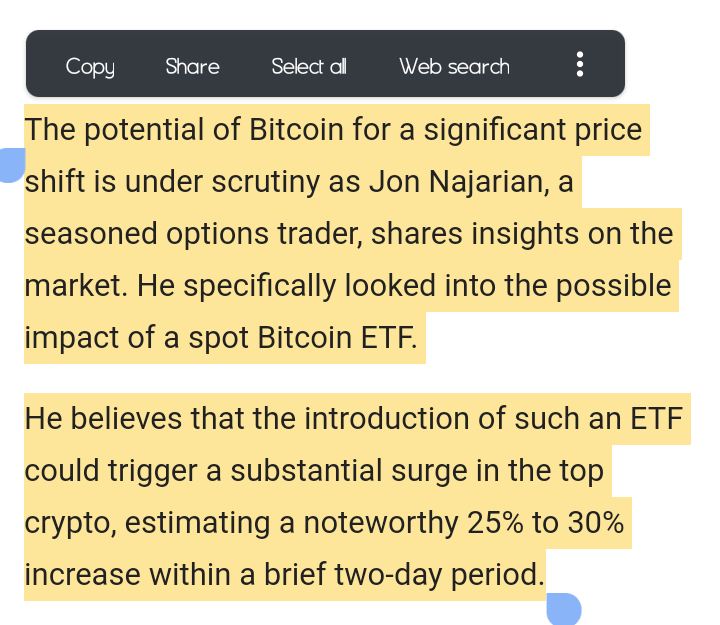
I decided to check his post history and discovered more plagarised post from op.

Update: the user has been banned.
Plagiarized
Crypto bulls think the erratic market is headed for new highs and are hopeful that more institutional investors will start embracing cryptocurrencies as a result of clearer regulations.
We have selected these cryptos below that we believe have what it takes to face the challenges of the market and tally significant price gains before December 25.
Top 5 Cryptos Seen Climbing Before Christmas
They are;
1. Avax
2. Ethereum Rising ETH
3. XRP Unfazed By Challenges
4. Solana Surges Amid DeFi Growth (sol).
5. Bitcoin Still Reigns Supreme (B.T.C).
As the holiday season approaches, the rationale behind selecting these cryptocurrencies as preferred assets reflects a diverse and informed investment strategy poised to navigate the evolving dynamics of the crypto market.
Original
Crypto bulls think the erratic market is headed for new highs and are hopeful that more institutional investors will start embracing cryptocurrencies as a result of clearer regulations.
We have selected these cryptos below that we believe have what it takes to face the challenges of the market and tally significant price gains before December 25.
As the holiday season approaches, the rationale behind selecting these cryptocurrencies as preferred assets reflects a diverse and informed investment strategy poised to navigate the evolving dynamics of the crypto market.

Ravichnadra
BTC seems under slim pressure as inflation continues to be a crucial issue in emerging economies such as the U.S. and the UK, and as anticipated the U.S. Federal Reserve hiked the interest rates with a 25-basis point to tackle inflation issues. As per experts, the major resistance is seen near the $29,800 level and the next major resistance is at the $30,400 level.
This is not the first time that BTC is under pressure. Bitcoin had seen a major fall that pushed the cryptocurrency below the $26,000 level, a three-month low, when the U.S. Securities and Exchange Commission sued one of the leading cryptocurrency exchanges in the world, Binance and its founder and chief executive officer, Changpeng Zhao (CZ).
The SEC blamed crypto exchange Binance for creating separate entities as Binance.com and Binance US, as segments of an elaborate scheme to evade U.S. federal securities laws. It has also alleged that a firm owned by its founder CZ, had been involved in artificially growing the trading volume of crypto assets, listed on its Binance U.S. platform.
Cryptocurrency experts believe that if BTC sticks to its level of $30,000, then it could bounce back likely from here and now is leading at $41,737 as of Dec. 05, 2023.
In April 2023, the top cryptocurrency Bitcoin touched the key resistance of $30,000 level, for the first time since June 10, 2022 and then started dipping below till $26,000 level and now has supremely raised at $41,737 after May 2022. Crypto experts believe Bitcoin must stick to the $31,000 level and more to touch the level of $60,000 by the end of the year 2023.

https://www.inferse.com/839786/bitcoin-price-prediction-can-bitcoin-reach-1000000-by-2025-forbes-advisor-india-forbes/
Saving vs. Investing
There's a significant difference between saving and investing. Saving is setting money aside in a safe place, where it stays until you want to access it, whether that's in a few days, a few months, or even several years. It might earn a little interest, depending on where you put it, and it will be there for you in case of an emergency or to achieve the goal you're saving for.
Common savings vehicles include:
.........................

https://www.thebalancemoney.com/the-most-important-rule-of-investing-357325

Jenwi
The Twitter/X account of the exchange added that users may see large cryptocurrency transfers on various blockchains made from its wallets.
Binance urged its community not to worry for their assets, assuring them that “funds are safu”, citing the former chief executive Changpeng Zhao (famous simply as “CZ”), who stepped down recently, handing his position to Richard Teng.

https://cryptonews.net/news/market/28188588/
As part of the process, the company says the withdrawal of assets will remain accessible for the next 3 months. Also, users can still trade with Buycoins Over-the-Counter (OTC) service through Desk.
“We genuinely appreciate your understanding and cooperation during this period. We understand that changes like these can be inconvenient, and we’re committed to assisting you in any way we can to facilitate a smooth sunsetting process. We extend our heartfelt thanks for being a part of the Buycoins Pro community. Your feedback, engagement, and support have been instrumental in shaping our platform. Should you have any queries or need assistance, please don’t hesitate to reach out to our support team at[email protected].” – The company added in the statement.
Notably, Buycoins had one app at launch in 2017. But later on, it metamorphosed into Basic and Pro. The former was for buying and selling (investing) digital assets while the Pro version which just got shut down was for advanced technical traders.
It is also worthy of note that the Basic version was rebranded into Accrue in October of last year when Buycoins acquired Accrue which is still active.
https://coinmarketcap.com/community/articles/657ca93087279170ec207c0c/
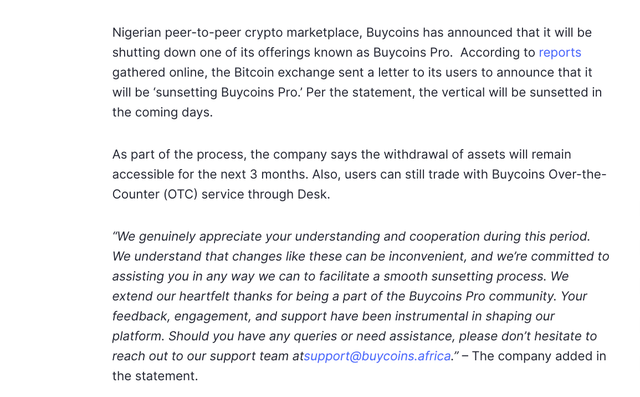

Jenwi
The Federal Government, FG, cannot stop cybercrime in Nigeria until the people’s orientation and value system are properly worked on.
According to, Babatunde Obrimah, Chief Operating Officer, Fintech Association of Nigeria, “Cybercrime is not peculiar to Nigeria. It is a global problem. But it has to do with our value system – the get-rich-quick syndrome. The young people see it in the leaders, and they also took that decision to get money because we celebrate money without looking at the source of the money.
“Nobody, even Federal Government cannot stop cybercrime. You can’t stop it. But you can reduce the impact by making sure that you do the right things. You can’t stop it because they are also coming up with new solution.
“As government is trying to block them, they are also looking into how to break into that. Someone sitting in North Korea can hack a bank in Brazil.
“It is a huge problem because in a day of manual banking, armed robbers attacked bullion van; they probably went away with N20 million, but someone can sit in his room and take N20 billion from another person’s account. So, it is a huge problem, and until we address our value systems, and actually we are able to ask ourselves questions, like this person is a civil servant, this person is a politician, even in the National Assembly, how much money do you earn that you should have this?
“Until we address those value issues with sincerity, it is problem we are going to have. It is not a localised Nigerian problem. It is a global problem. It is just that we have a situation that a young people just see that as an opportunity to get rich quick, buy flashy cars, live in decent part of the city, wear designer clothes, and life is not about that,”
This has caused congestion in prison whereby so many inmates were acquitted on the approval of the executive arm of government in various states as a way of decongesting the prison. There are progressive cases of EFCC and police arresting and parading fraudsters daily adding to our normal civil and criminal cases.
In less than 5 minutes, a fraudster will wipe your account if they should get in touch with your bank alert SIM card or A.T.M card. This has posed risk in the banking systems. It would have been better if the only victims are our politicians because they are the bigger thieves killing the country but the common struggling man is always at the position of being a victim.
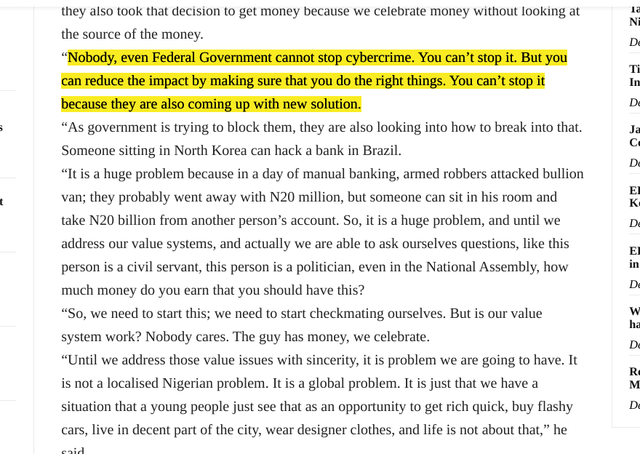 https://thestreetjournal.org/fg-cant-stop-cybercrime-in-nigeria-expert/
https://thestreetjournal.org/fg-cant-stop-cybercrime-in-nigeria-expert/This user was given some advice to add a link to the source. But he doesn't read the replies to the topics he creates.
Fintech also includes the development and use of cryptocurrencies, such as Bitcoin.
Fintech and crypto have the potential to transform the way people and businesses interact with money, by offering faster, cheaper, and more transparent solutions. One of the most prominent examples of fintech is cryptocurrency, which is a digital asset that can be used as a medium of exchange. Cryptocurrency relies on blockchain technology, which is a distributed ledger that records and verifies transactions without intermediaries.
It eliminates intermediaries, minimizing paperwork, and streamlining processes, blockchain can reduce transaction costs in fintech. Blockchain in fintech is a perfect opportunity to automate many routine tasks and direct the workforce towards more complex processes, such as fraud detection
However, cryptocurrency also faces many challenges, such as volatility, regulation, scalability and adoption.
However, it eliminated the need for consumers to carry physical currency in their day-to-day lives. From there, fintech evolved to include bank mainframes and online stock trading services.
On the other hand, Blockchain technology allows for decentralized transactions without a government entity or other third-party organization being involved. Blockchain technology and applications have been growing quickly for years, and this trend is likely to continue as more industries turn to advanced data encryption.

https://bootcamp.cvn.columbia.edu/blog/what-is-fintech/
It looks like a bad post either Ai or plagiarism .

User: Felix080
Copy:
Leandro Trossard will want to start against his former club and he could come into the frontline, while Jorginho is expected to retain his place at the base of midfield after starring at St. James’ Park.
Jakub Kiwior should continue alongside Gabriel at centre-back, and Kieran Tierney could make a rare Premier League start amid Oleksandr Zinchenki’s recent defensive struggles.
While on the brighton side, Roberto De Zerbi will almost certainly make a few changes to the side that was thumped by Everton on Monday. Solly March and Julio Enciso are two contenders to return to the fold, and they could replace Facundo Buonanotte and Deniz Undav respectively. Injuries have forced the Brighton manager to improvise with his right-back selection as of late, but a potential solution could be re-introducing Levi Colwill to the starting XI and deploying Adam Webster on the right.
Adam Lallana, Tariq Lamptey and Jeremy Sarmiento are all sidelined for the visitors, while Joel Veltman is a major doubt. Evan Ferguson is back in contention, however. I'm rooting for a 3-0 win against Brighton.
Original:
https://paininthearsenal.com/2023/05/11/arsenal-vs-brighton-preview-prediction-team-news-lineups/
United are huge outsiders to claim victory at Anfield, with Liverpool a point clear at the top of the Premier League - five places and 10 points above United.
Jurgen Klopp's side also thrashed United 7-0 in the same fixture last season and Ten Hag's outfit face the daunting task of taking on their rivals with a heavily depleted squad.
Bruno Fernandes will miss the fixture due to suspension after the captain picked up a fifth yellow card of the season for dissent in last weekend's 3-0 home loss to Bournemouth. This match will indeed be a nightmare for the red devils.
Original:
https://www.skysports.com/football/news/11095/13030083/liverpool-vs-man-utd-erik-ten-hag-could-be-without-up-to-13-first-team-players-for-premier-league-showdown
United are huge outsiders to claim victory at Anfield, with Liverpool a point clear at the top of the Premier League - five places and 10 points above United.
Jurgen Klopp's side also thrashed United 7-0 in the same fixture last season and Ten Hag's outfit face the daunting task of taking on their rivals with a heavily depleted squad.
Bruno Fernandes will miss the fixture due to suspension after the captain picked up a fifth yellow card of the season for dissent in last weekend's 3-0 home loss to Bournemouth.
(archive)

teamsherry
https://bitcointalksearch.org/topic/m.63309849
Where it was copied from
https://ivypanda.com/essays/bitcoin-digital-currency-usage/
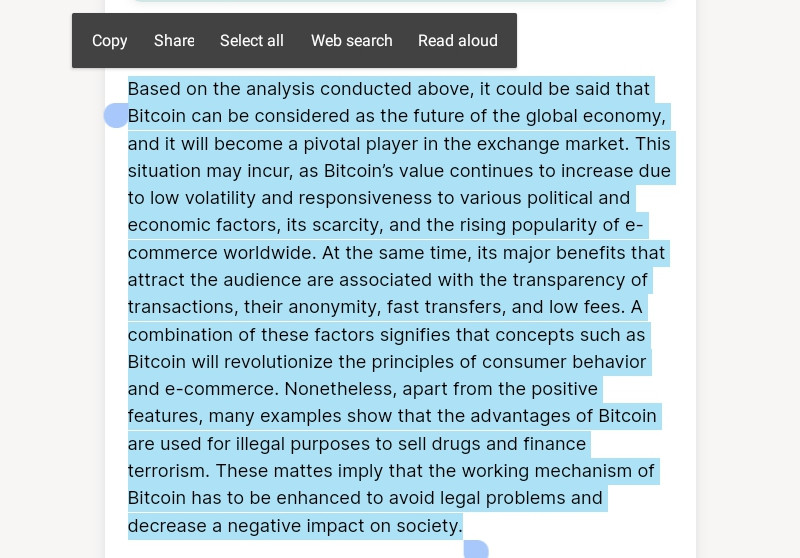

I don't know whether it is correct to reply to this post.@lovesmayfamilies Bro fixed the post against me because I made a mistake for which I apologize to you guys I don't want or will do such a mistake in future.
I was in the car when I made the post that I didn't feel like giving the source link for.
"Only humans make mistakes."
I am human too so I make mistakes so apologies to all of you for those mistakes maybe I will get an opportunity from you to work on the forum in the future.
I apologize for this to everyone.🙏
@lovesmayfamilies have your hard heart a little kindness for me.🙏
The moderators have not banned you, but remember that you are walking on a knife's edge by regularly copying news, even with a link to the source. This doesn't seem like a relevant or useful post. Perhaps you have seen several deleted posts? By creating topics without your own opinion about the news you copy every time, you will forget to provide a link one day. The second time may be your last step on the forum. Try to write on your own; everything that is on the Internet is available to you. But this is also available to everyone else. There is no need to transfer everything to the forum and hope for merit in the topic of El Salvador.
And I'm not your Bro!

AirtelBuzz
Bitcoin mining is the world's best technology for converting energy into wealth."El Salvador's use of 100% renewable energy from volcanoes for Bitcoin mining showcases a sustainable approach, aligning with environmental consciousness in the crypto space. El Salvador hit the headlines in 2021, becoming the first country to give bitcoin legal tender status. It first started mining bitcoin using geothermal energy from its volcanoes the same year.
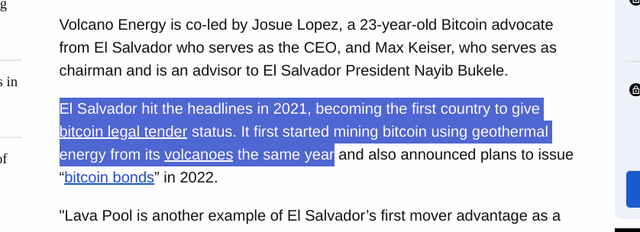
https://www.theblock.co/post/254976/volcano-energy-luxor-launch-lava-pool-el-salvadors-first-bitcoin-mining-pool

UpTober
I was in the car when I made the post that I didn't feel like giving the source link for.
"Only humans make mistakes."
I am human too so I make mistakes so apologies to all of you for those mistakes maybe I will get an opportunity from you to work on the forum in the future.
I apologize for this to everyone.🙏
@lovesmayfamilies have your hard heart a little kindness for me.🙏

AirtelBuzz
Bitcoin mining is the world's best technology for converting energy into wealth."El Salvador's use of 100% renewable energy from volcanoes for Bitcoin mining showcases a sustainable approach, aligning with environmental consciousness in the crypto space. El Salvador hit the headlines in 2021, becoming the first country to give bitcoin legal tender status. It first started mining bitcoin using geothermal energy from its volcanoes the same year.

https://www.theblock.co/post/254976/volcano-energy-luxor-launch-lava-pool-el-salvadors-first-bitcoin-mining-pool

UpTober
El Salvador has unveiled a new citizenship investment program, the "Independence Visa", open to a limited number of applicants. By investing $1 million in Bitcoin or Tether, participants can secure Salvadoran citizenship.
El Salvador, recognized to grant Bitcoin ( BTC ) legal tender status in 2021, has now launched the "El Salvador Freedom Visa Acceptance" program. With an annual cap of 1,000 participants, the initiative aims to attract high-net-worth individuals, offering them residency and eventual citizenship in exchange for their investment, reflecting various visa schemes in a wide array of countries

https://news.bitcoin.com/el-salvador-introduces-exclusive-citizenship-through-1-million-crypto-investment/




